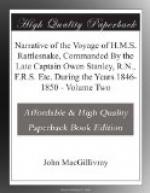August 17.
This morning we commenced to prepare our breakfast of horse-flesh. I confess we did not feel much appetite for the repast, and some would not eat it at all; but our scruples soon gave way beneath the pangs of hunger, and at supper every man of the party ate heartily of it, and afterwards each one claimed his share of the mess with great avidity. The country to the north and north-west—the course we intended to pursue—looking very rugged and broken, we were discouraged from proceeding further this day, as the weak state of our horses prevented us making almost any progress. We therefore camped by the side of a small rocky creek, winding through the mountains in all directions.
August 18.
Shortly after starting this morning we crossed a creek, running south-west, with a few arborescent Callistemons growing out of the rocks here and there. The horse which Mr. Wall had been riding had grown so weak that it was unable to travel, even with nothing to carry but the saddle. As we were passing along the side of a hill, he fell and rolled down into a gully. Being quite a young horse we thought he might regain strength, and did not like to kill him, so we left him and proceeded to find a good place for camping, which we did after travelling about four miles in the north-west direction, by the side of a fine river, with steep reedy banks, lined with large casuarinas and flooded-gum trees, and abundance of grass growing in the valley of the river. At this camp the feet of our horses were all carefully examined by Costigan, who was a blacksmith: it was also his duty to mark the number of each of our camps on some adjacent tree.
August 19.
Wall rode back to see if he could bring up the horse we had left behind, but on reaching the spot found him dead; one of our kangaroo-dogs had also stopped behind by the horse, being unable to follow us to the camp. We had the good luck to succeed in catching several fish in the river, and, what was better, shot a fine wallaby, which saved us another sheep. We had all along been particularly unfortunate in getting anything from the bush to add to our mess, not having been able either to shoot or catch anything for some time past except a few pigeons and two or three brown hawks.




